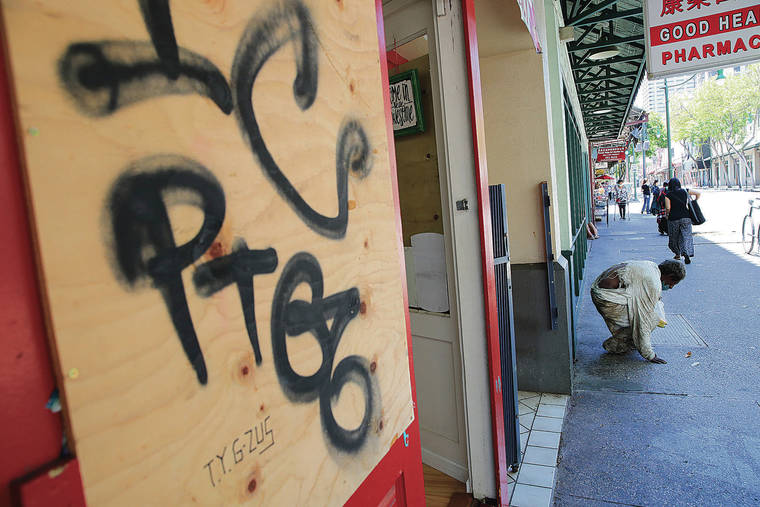L&L co-founder Eddie Flores critical of Mayor Rick Blangiardi’s Chinatown efforts

JAMM AQUINO/JAQUINO@STARADVERTISER.COM
A homeless man sits along Hotel Street in Honolulu’s Chinatown.
Eddie Flores, chairman of the ubiquitous L&L Hawaiian Barbecue chain, is willing to pay out of his own pocket to help beautify Chinatown but worries about the bigger problem of Chinatown’s homeless, which he sees getting worse.
Flores has been unable to get a meeting with Mayor Rick Blangiardi to discuss Honolulu’s original neighborhood where Flores grew up. And he’s worried that Blangiardi’s plans for Chinatown offer no obvious path to getting housing and medical assistance for Chinatown’s homeless, especially the chronically homeless with mental health issues.
Flores, 74, grew up in Chinatown after his family immigrated from Hong Kong in 1963. Now Flores is afraid to eat dinner in Chinatown because of all of the homeless activity at night.
“I love Chinatown,” Flores told the Honolulu Star- Advertiser on Monday, “but now I’m scared to go down there at night.”
Blangiardi told the Star- Advertiser that he is upset about Flores’ response to Blangiardi’s Chinatown efforts and said he was never contacted about meeting with Flores about Chinatown — but he did get a message Friday from Flores asking to discuss a sister city relationship with Fuzhou, China.
Fuzhou, China, is not one of Blangiardi’s top priorities for now.
Don't miss out on what's happening!
Stay in touch with breaking news, as it happens, conveniently in your email inbox. It's FREE!
“I’m upset about that. It’s wrong,” Blangiardi said. “That is typical. That is typical to say what we’re not doing versus all that we are doing. The combination of all we’re doing … is designed on helping Chinatown.”
On Friday, Blangiardi’s office provided a list of Chinatown-related efforts, including the planting of new, hardier trees; improvements at municipal garages; and upgraded security cameras and elevators, roof repairs and drain replacements at the city’s Chinatown housing projects.
There were no plans aimed at getting immediate treatment and housing for Chinatown’s homeless.
Instead, Blangiardi’s projects as outlined Friday pledged to:
>> Continue negotiations with River of Life Mission to relocate homeless feeding services to Iwilei. River of Life’s feeding program originally was created to address the needs of Chinatown’s homeless but more recently has been blamed as a homeless magnet by Chinatown merchants.
>> Continue to provide stored property and sidewalk nuisance ordinances enforcement, “as necessary.” Blangiardi repeated Monday that former Mayor Kirk Caldwell’s “compassionate disruption” approach of sweeps and simultaneous offers of assistance does not work. Honolulu police have not responded to a Star-Advertiser request for citation records on homeless efforts islandwide since 2019 and specifically in Chinatown during Blangiardi’s first months in office.
>> Work with the city Prosecutor’s Office on a “Weed &Seed” crime enforcement program.
>> Conduct community walks with business owners and residents “to understand and identify specific concerns.”
>> Continue a “formal planning process” for a new way to respond to homeless complaints involving medical and mental health responders and social workers instead of police.
Anton Krucky, the city’s executive director of the Office of Housing, acknowledged Monday that “there’s no silver bullet” to reducing homelessness on Oahu — especially in the era of COVID-19, which has forced homeless shelters to reduce bed space and with landlords faced with eviction backlogs who may be reluctant to rent so-called Housing First apartments to chronically homeless people living on the street.
The city’s potential CORE program is based on several cities on the mainland, particularly Denver, which has seen more efficient use of its police officers, Krucky said.
In Honolulu, Krucky also hopes to see more homeless people housed and into treatment.
“That’s still one of the big issues,” Krucky said. “Somebody has to have a place to go and hopefully will want to go (to).”
“Chinatown, one of the oldest Chinatowns in the United States, has the potential to be the heart and soul of Honolulu, a place where people from all over our island, state and the world can eat, shop, enjoy live entertainment and nightlife, visit art galleries, and immerse themselves in Chinatown’s rich history and culture,” Blangiardi said in a statement. “We will turn this long neglected historic front of Honolulu into a safe and vibrant community we can all be proud of.”
In 2018 the Institute for Human Services counted 172 homeless people in Chinatown throughout the year. There was no national Point in Time Count homeless census conducted this year because of COVID-19.
But last week Chinatown merchants and residents repeatedly told the Star-Advertiser that Chinatown’s homeless numbers are growing, a commentary that Blangiardi said he and his staff also heard.
“They feel it’s gotten worse,” Blangiardi said.
Flores, a former director of the Chinatown Chamber of Commerce, has been pushing the organization to focus more on community problems rather than on cultural events.
Flores originally offered to pay to clean up the tiny and graffiti-filled Chinatown arch at King and River streets but could never get city permits.
At former Mayor Caldwell’s original request, Flores said he remains willing to pay for an even more impressive arch at Kekaulike and King streets but still cannot get permits four months into Blangiardi’s term.
“It doesn’t matter how much we do,” Elvira Lo, president of the Chinese Chamber of Commerce, told the Star-Advertiser. “The most important thing is to take care of the homeless … and help them medically. It will be good for Honolulu, generally.”
The long-term revitalization of Chinatown relies on one issue, Flores said.
“The biggest problem is the homeless, or it will be the same,” Flores said. “We can try to make improvements, but we’ve got to do something about the homeless.”



